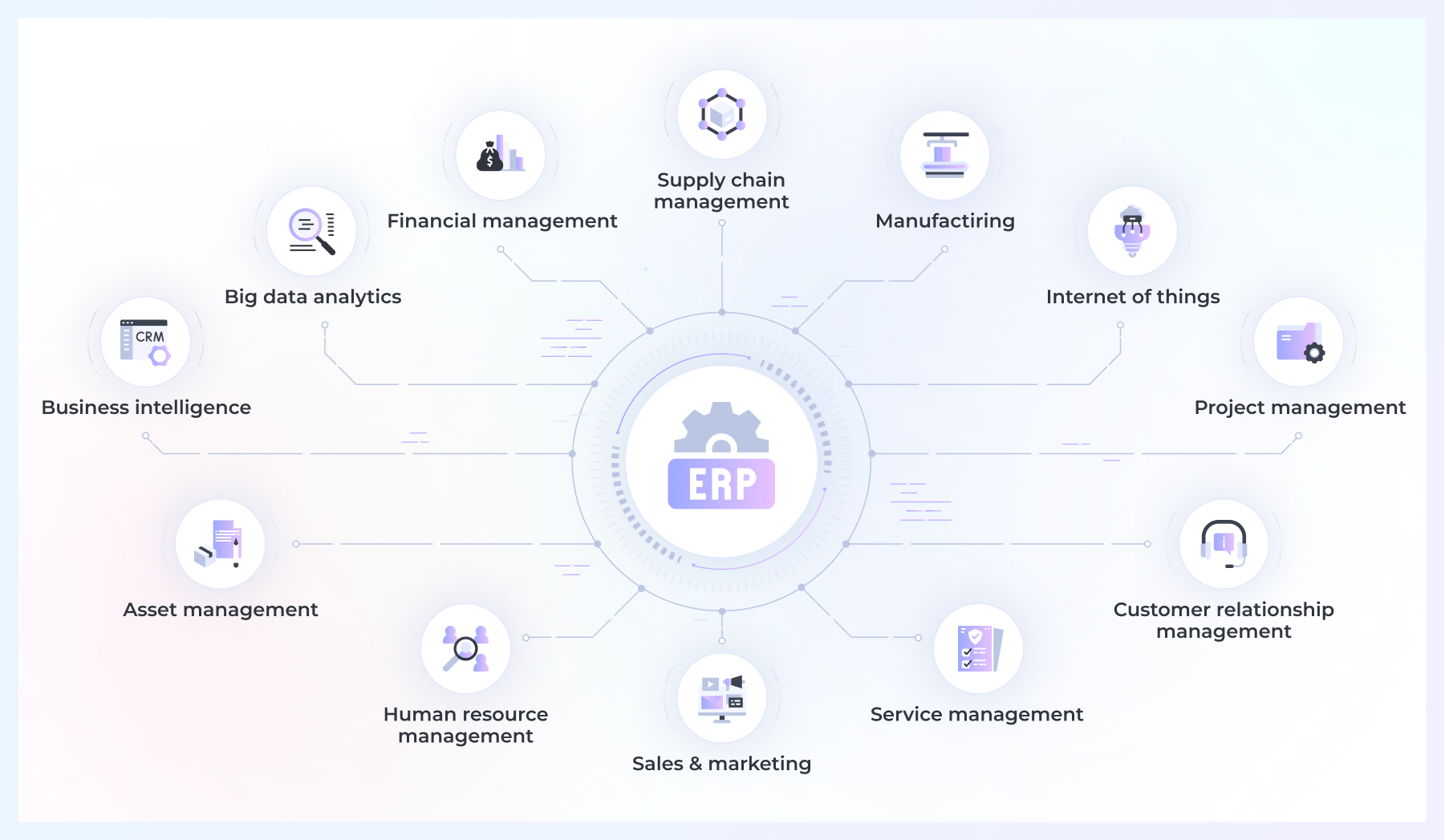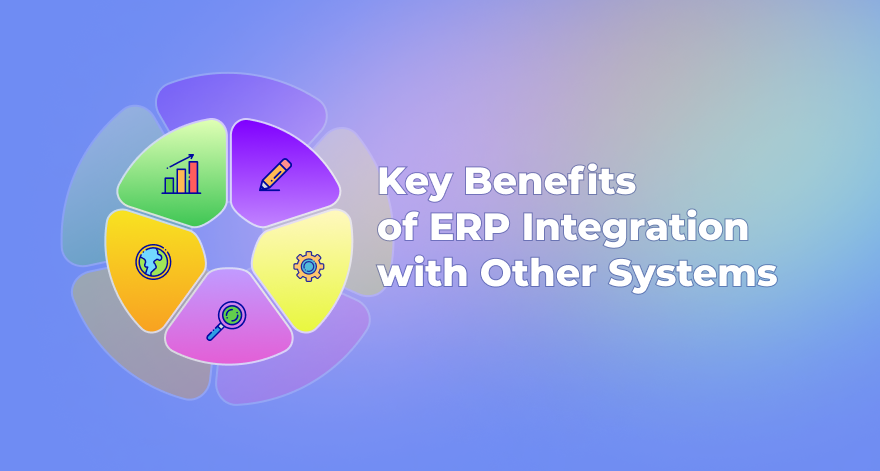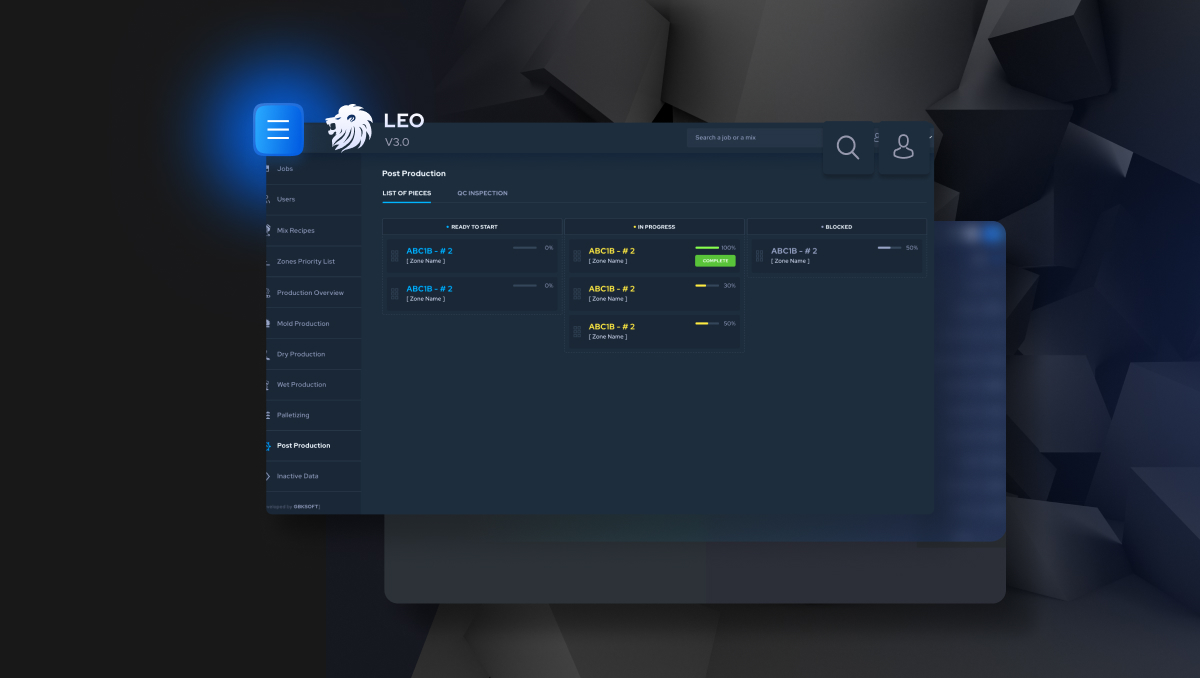Enterprise Resource Planning Software has already grown further than a system to manage the back-office of the business. Right now, an ERP system can transform into a centerpiece of the business processes and connector between different platforms you have implemented for your business.
Moreover, traditional ERP systems are no longer monolith constructions. A lot of new approaches have arisen, including the postmodern ERP strategy. ERP system integrations with other software is a wise way to increase the efficiency of your team and resolve productivity problems.
In this article, we will discuss the main aspects you should know about ERP integrations, and what other software pieces you can connect to ERP to get the maximum from all systems you have onboarded to your IT ecosystem.
What is ERP System Integration?
An ERP system, at its core, is designed to streamline business processes, remove data silos, and ensure connectivity between different departments (HR, sales, supply, manufacturing, etc.).
As we mentioned, ERPs have overcome a long path from on-premise massive software pieces to more flexible cloud-based solutions. If in the nineties, when the history of ERP has only begun, ERP systems were cumbersome and demanded a lot of IT support and maintenance, then now you can have your software piece placed in the cloud and hence, obtain more flexibility and power for smaller money.
New capacities also provide new opportunities in business intelligence, including ERP integrations. Though modern ERPs can have various modules which cover a big range of business processes, it might not be enough for your business.
ERP integration implies that your software will be connected with other software programs and platforms, for example, eCommerce ones or other BI software.
ERP Systems Integration Methods
There are several main strategical approaches you might use for ERP integration.
Hence, it has that level of flexibility and cost-efficiency that is a сloud-based approach to this process and provides quicker and easier integration capacities than ESB. It also requires no additional hardware, and therefore, has that level of flexibility and cost-efficiency that is perfect for most businesses nowadays.
Of course, the option to use a custom development and design a custom application that will take care of integrations between systems. It might be the best option, as you will be able to obtain a system designed precisely for your needs, requirements, and possibilities.
How to Choose What Method of ERP System Integration Is the Most Suitable For You?
The choice of ERP integration methods depends on different factors – the volumes your ERP system integration should withstand, the number of business intelligence software pieces you want to connect with ERP, etc.
- Point-to-point integration will be suitable for small businesses that don’t need more than one integration.
- ESB will be suitable for companies that need to connect several systems and ensure data integration between them.
- iPaaS is a more modern and efficient way to integrate different software pieces, and it will be more cost-efficient, as it doesn’t require any hardware as the cloud is used.
However, we would suggest choosing a custom application as one of the most efficient ERP integration methods. It might take more time to develop and implement than ready-made solutions, but it will be a great fit for your business needs, and it could be easily changed and grown together with your company.

Integrate your business software with custom ERP software.
Learn more about custom ERP capacities from our managers.
Postmodern ERP strategy
The concept of a postmodern ERP system is rather a fresh point of view on how businesses can get the most out of ERP software and how to optimize ERP implementations from every aspect (productivity, cost, efficiency, etc.).
Postmodern ERP deconstructs the concept of using traditional ERP suites and replaces them with the best applications in the area (sales, inventory management, supply chain management, business intelligence, etc) and ensures seamless integration between every part.
Benefits of ERP Integration
So, now, when you understand what ERP integrations imply, let’s talk about why it is important, and relevant for any modern business and why you should spend resources on ERP integrations.
Better Data Management
ERP integration with other management software pieces like customer relationship management (CRM) systems enables seamless data flow and data integrity in one system. Hence, instead of constantly switching between different applications, your employees need to navigate only through one system.
Data visibility is a key to automated processes, efficient business workflows, and the availability of real-time data for your employees. You will remove resource losses to long communications, chaotic data updates, and other delays caused by manual data entry and data being scattered between different systems.
ERP integration also reduces the chance of data duplicates you might face while working with the same or similar databases you merged from other systems.
Enhanced Insights and Visualization of Workflows
When you have all data in one place and you streamline processes, you break the data silos a lot of companies get stuck in. These silos stop adequate data collection and exchange between departments and hence, they slow down dozens of processes and decisions.
ERP software integration helps your employees get out of the aforementioned silos, access all data available, and see the workflows as they function.
With such data transparency, the company’s employees will be able to synchronize better with others and make decisions more wisely and efficiently.
Increased Workforce Productivity
ERP integration implies that major time-consuming processes will be automated. It means two positive things for businesses.
Firstly, a lot of tasks will be done more quickly and the overall throughput of your team will increase. Your company will be able to process more requests, orders, etc. throughout the day, which means a significant boost in productivity and consequently profits.
Secondly, your employees will be relieved from manual processes and tasks. This way, they will have more time to dedicate to strategical tasks and tasks where personal contact is essential for success. Globally, this means that there is a lower chance of burnout as the amount of monotonous work will decrease, and higher employee retention.
Reduced Training Time
Every software piece demands time and effort from employees to adapt, study and get used to. Moreover, the adoption of several systems at once might be too confusing and difficult for staff, as well as for new employees who will join your team and be bound to learn how to work with all of them.
Singe integrated ERP systems will be easier to explain to employees. Usually, the changes might be hard to accept for a team that has already gotten used to a legacy system. Your goal is to make the transition process smooth and simple, and bringing an ERP system integrated with others is a way to achieve that.
Reduced Human Errors
The value of the human factor to the business can’t be overrated, especially in sales, management, etc. However, people tend to lose focus, get tired, get distracted and make mistakes, for example, while doing manual data entry.
Data errors and duplicates might bring a lot of further issues and in the end, just take more time and effort from employees who would need to fix the problems and check the rest.
Automation powered by ERP integration helps to remove this problem, as now, the majority of data operations will be handled by algorithms and software solutions that tend to have more accuracy than people.
Holistic Customer Image
CRM or eCommerce solutions have already a lot of customer data you might leverage to improve your services and offers. However, their integration with ERP solutions will give you even more insights into your customer profile.
ERP integration will assemble data on your customer behavior, order record, buying habits, preferences, and other information that will help you find a more efficient approach to this certain client and their needs.
Data-Driven Strategy
All of the aforementioned benefits of ERP integration show that it is related to more efficient and profound data management. Data visibility and visualization, as well as its integrity within one business system, allows you to understand it better and leverage it wisely.
You might find bottlenecks that create difficulties for your team, places for improvements and optimization, new ideas, and potential for further growth and development.
What Systems Can You Integrate With Custom Enterprise Resource Planning Software?
So what other systems can you integrate ERP with and get a significant boost for your business processes and company’s efficiency? Let’s contemplate the most common types of ERP integrations.

Power up your IT ecosystem with custom ERP integrations.
Learn details from our managers.
Why Custom ERP System Is Better Than Ready-Made?
Let’s imagine a situation: your company decided to adopt ERP software. You have also used other software solutions like a CRM system, a project management tool, and an eCommerce solution to process online purchases. You have a choice: choose one of the ready-made solutions present on the market or invest in the development of a custom enterprise resource planning software.
Each option has its own benefits and disadvantages. Let’s look through them.
The big advantage of ready-made software is its availability. You don’t need to wait till it would be developed, and you can integrate it relatively easily, though you still will need to involve a third-party provider who will be able to run integration and transfer your data correctly.
However, from a long-term perspective, ready-made solutions can become too cumbersome and demanding, as you have certain restrictions within functionality and interfaces. Scalability might also become an issue, as usually, ERP vendors charge for every new user.
Certainly, custom ERP development is a big project that will require resources, time and effort from the company which needs ERP, as well as from the software development vendor in charge of its creation.
However, a custom solution will be a better match for any business, if it has an opportunity to make such an investment.
Real benefits of custom-made ERP
According to the experience of our clients, the custom ERP system recoups in two-three years, while giving a significant boost to the productivity of the company and helping it grow beyond the previous possible limits.
The benefits of a custom ERP system include:
- custom design and architecture tailored for your business needs, goals, and processes;
- enhanced cybersecurity and system stability;
- easy scalability and redesign to cater to your growth or changes;
- full control over the system, its databases, and userbase;
- easy integration into the workflow and adoption, as it should match all processes that are already set up.
If we are talking about custom ERP integration with other systems, it is worth mentioning that ERP integration strategy will be included in the scope of work. Hence, all integration capacities will be done with high quality, as developers will work with specific connections, instead of releasing general solutions as it could be with ready-made solutions.
Custom ERP Systems Development & Integrations with Altamira
Altamira is a software development vendor experienced in ERP development and integrations. For more than a decade, we create software solutions that help businesses grow and scale.
While developing your ERP system, we offer:
- detailed discovery stage, during which we research your business and determine the most efficient solutions in software architecture, technology selection, development process, team composition;
- full cycle of development, from the first concept to the released and integrated ERP system;
- a solution group of core tech experts, who will focus on creating a strategy for your product, its development, and possible contingency plans;
- data migration that will help you set up the ERP system and save all the information you have generated during the years of work.
By choosing Altamira, you also benefit from:
- a team of more than 100 tech experts with years of experience and diverse skills;
- a high level of ownership over the project and hence, high quality of the code and product;
- transparent pricing and regular reporting from the delivery department;
- a dedicated customer success team that works to improve your experience with us;
- flexible cooperation options and conditions.
Our Success Stories
Here are the main examples of our work in ERP development.
Leo: ERP System for Construction Company
Leo is an ERP system designed for the construction company. For 10 years, our client tried to find or develop a solution that will resolve their productivity challenges.
Luckily, our cooperation has helped to achieve this goal, and we have created a self-sufficient ERP system within 6 months. Leo automates the major processes in our client’s production cycle, as well as enables automated data management. As a result, the company was able to reduce employees’ workload and increase overall productivity.
Soljets: Enterprise Resource Planning System for Jet Brokerage Company
Our client Soljets is a jet brokerage and acquisition company. At a certain point in its existence, the company’s management made a decision to adopt modern tech solutions to stay competitive and ensure the productivity of the company.
They come to us with a request to create a united system for data collection, exchange, and processing to streamline processes.
We have developed such a system during the 18 months, and the client stated that the result exceeded their expectations. The team managed to grow about 2-fold of revenue after the adoption of the ERP system developed by our team.
Learn more about Soljets case in our latest interview with our partner.
In Conclusion
ERP software is a must-have for any SMB that plans to grow and develop further. It brings even better results if successfully integrated with other software pieces, as seamless data exchange is a key to connectivity and automation businesses strive for.
Custom ERP software and custom integrations allow us to get the most of every software piece you use. Choose a reliable ERP development vendor, and you have a big chance to succeed with ERP implementation.

Initiate custom ERP development with our team.
Get the best possible solutions by cooperating with us.





